|
|
|
Sort Order |
|
|
|
Items / Page
|
|
|
|
|
|
|
| Srl | Item |
| 1 |
ID:
126959
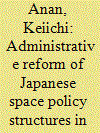

|
|
|
|
|
| Publication |
2013.
|
| Summary/Abstract |
In Japan, there are several government ministries and agencies with important roles in the development and use of space. In 2012, Japan restructured its administrative organs related to the development and use of space through legal amendments to the original acts that established these organs. Although this was an important administrative reform that took four years of planning and discussion to accomplish, this restructuring has not been communicated well outside of Japan. This study provides the first comprehensive overview of the recent legal changes in Japanese space policy. In contrast to some reports, the Ministry of Education, Culture, Sports, Science and Technology (MEXT) still has primary responsibility for the finances and personnel of the Japan Aerospace Exploration Agency (JAXA). This continues to be true even after the Cabinet Office begins its new role as the focal point for formulating Japanese space policy. It remains to be seen how the policy direction of the Cabinet Office will interact with the operational, financial, and personnel responsibilities of MEXT. I argue that knowledge of the roles of MEXT and the Cabinet Office in space policy, and the tension between the two organizations, is key to understanding Japan's future space policy decision-making process. By tracing the history of Japanese space policy since 2001, I also suggest that if bureaucrats had thought more deeply before making major reforms to space policy and its administration, there would have been less confusion over the development of national space policy this past decade. This paper concludes by identifying some key elements to monitor in the coming years of Japan's space policy.
|
|
|
|
|
|
|
|
|
|
|
|
|
|
|
|
| 2 |
ID:
126954
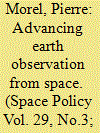

|
|
|
|
|
| Publication |
2013.
|
| Summary/Abstract |
Global Earth observation goes well beyond taking pictures of the Earth from space. Earth observation aims to identify and characterize planetary-scale processes that occur in the Earth interior or the world's oceans, at the Earth's surface or within the global atmosphere, on the basis of weak signals that may be detected in space. This is a truly challenging task that requires the dedicated efforts of professionals and firm public support commitments. The article reveals the scope of global Earth observation, highlights the technical and managerial challenges involved in undertaking it and discusses ways of making it more effective. Competent international cooperation and cost-sharing arrangements are essential for the ultimate success of existing and future activities in this field.
|
|
|
|
|
|
|
|
|
|
|
|
|
|
|
|
| 3 |
ID:
126957


|
|
|
|
|
| Publication |
2013.
|
| Summary/Abstract |
Since ESA's establishment the context in which it operates has evolved greatly, from one of development of technologies and general competence to one of responding to the needs of an increasingly wide range of users, many of whose requirements straddle several applications categories. The IAP programme is ESA's response to this challenge, aimed at fostering the growth of a downstream industry, creating a market for the space industry and serving economic growth overall. The programme's structure and the platforms themselves are described and the programme's achievements and prospects presented. Its success testifies to ESA's continuing ability to adapt to changing environments and operate effectively in new sectors.
|
|
|
|
|
|
|
|
|
|
|
|
|
|
|
|
| 4 |
ID:
126958
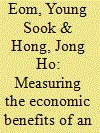

|
|
|
|
|
| Publication |
2013.
|
| Summary/Abstract |
This paper reports a first application of contingent valuation method to measure the value of information generated by earth science data from an environmental geostationary satellite payload called Geostationary Environmental Monitoring Satellite. The purpose of the space project is to improve the accuracy of air pollution information by enhancing air pollution monitoring and forecasting system coupled with conventional ground level monitoring stations located throughout South Korea.
Estimation results based on a survey data of 1000 households show that most explanatory variables including bid amounts and household income significantly influenced dichotomous choice contingent valuation responses with expected signs. When applied to the whole sample, mean willingness to pay reflecting both use and non-use values was stable at around $3.70 per year for the improvement of air quality information. Present values of total benefits over the lifetime period of the space satellite exceed the cost born by tax payers with a benefit-cost ratio of 2.77. The result of this study clearly suggests that contingent valuation method can be used as an alternative approach in measuring the value of information from a space-derived earth science project.
|
|
|
|
|
|
|
|
|
|
|
|
|
|
|
|
| 5 |
ID:
126955
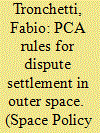

|
|
|
|
|
| Publication |
2013.
|
| Summary/Abstract |
Outer space activities have evolved significantly. While they were previously the exclusive domain of a restricted number of states, now thanks to technological advances and the easing of governmental restrictions, space activities are carried out on a much larger scale and involve subjects of both a governmental and non-governmental nature. Furthermore, the commercial uses of outer space are making space business increasingly profitable and attractive to potential investors. As the economic value of outer space activities, as well as the number of space actors grows, it is nearly inevitable that international disputes related to the use of outer space will occur. Until recently, international space law contained little dedicated machinery to settle international outer space-related disputes. This absence significantly weakened the applicability and enforceability of space law and contributed to a climate of uncertainty. In order to address these issues, the Permanent Court of Arbitration (PCA) adopted the Optional Rules for Arbitration of Disputes Relating to Outer Space Activities on 6 December 2011. The PCA Space Rules represent a significant development in the field of space law because they provide a voluntary and binding dispute settlement method accessible to all space actors and modeled on the specific legal and economic characteristics of space activities. This paper describes the genesis of the PCA Space Rules, assesses their content and innovative character, evaluates their possible implications for the settlement of outer space disputes, and argues that they should be positively received by the outer space community.
|
|
|
|
|
|
|
|
|
|
|
|
|
|
|
|
| 6 |
ID:
126953


|
|
|
|
|
| Publication |
2013.
|
| Summary/Abstract |
In 2012 a working group was established to formulate the African space policy and strategy which would lead to the establishment of an African Space Agency (ASA). Dr Peter Martinez asserts in his article "Is there a need for an African Space Agency?" [1] that the arguments that have been posited in support of an ASA are flawed; namely the arguments of the existing example of the European Space Agency (ESA), and that an ASA would lead to fostering competition, synergy, industrial development and capacity building. While this viewpoint agrees that all the perfect conditions may not exist at present for the creation of an ASA, it addresses some of the issues raised by Martinez, and proposes ideas to foster intra-regional cooperation.
|
|
|
|
|
|
|
|
|
|
|
|
|
|
|
|
| 7 |
ID:
126956
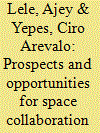

|
|
|
|
|
| Publication |
2013.
|
| Summary/Abstract |
India in Asia and Brazil in Latin America are regarded as the most promising global economies. This paper examines the openings and possibilities for space technology collaboration between India and Latin American states under the larger rubric of science and technology collaboration. While the distance and language barriers between the two regions have proved a hindrance in the past, the paper proceeds with an assumption that, in the 21st century, such barriers should not be a limitation on developing strategic, economic, and science and technology partnerships among nation-states. The paper argues that the Latin American states are keen to have their own satellites because of their significant utility in the socioeconomic sector and this offers an opportunity to India to use cooperation in space technologies as a powerful tool for engagement in Latin America.
|
|
|
|
|
|
|
|
|
|
|
|
|
|
|
|
|
|
|
|
|